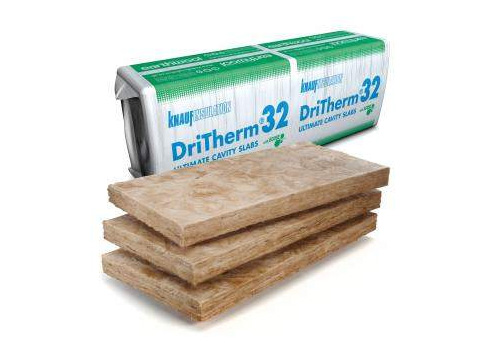In the realm of insulation materials, the choice between different products can significantly impact the energy efficiency, comfort, and environmental footprint of a building. Knauf Dritherm Cavity Slab 32 insulation stands as a popular choice among builders and homeowners, but how does it compare to other insulation solutions on the market? In this article, we’ll explore the key differences and similarities between Knauf Dritherm Cavity Slab 32 insulation and other insulation options, helping you make an informed decision for your next construction or renovation project.
Material Composition and Structure:
Knauf Dritherm Cavity Slab 32 insulation is composed of glass mineral wool, a versatile and effective insulation material known for its thermal properties and fire resistance. The insulation slab is designed to fit snugly between cavity walls, providing a barrier against heat transfer and improving energy efficiency. Other insulation solutions may use different materials such as foam boards, cellulose, or rock wool, each with its own set of advantages and disadvantages. Understanding the material composition and structure of each insulation option is crucial in comparing their performance and suitability for specific applications.
Thermal Performance:
One of the primary considerations when comparing insulation solutions is their thermal performance. Knauf Dritherm Cavity Slab 32 insulation boasts excellent thermal conductivity, effectively reducing heat loss or gain through walls and improving indoor comfort levels. The insulation’s high density and low thermal conductivity contribute to its superior thermal performance compared to some other insulation materials. However, the thermal performance of insulation solutions can vary depending on factors such as thickness, installation quality, and environmental conditions.
Moisture Resistance:
Moisture resistance is another important factor to consider when comparing insulation options, particularly in damp or humid environments. Knauf Dritherm Cavity Slab 32 insulation is designed to resist moisture absorption, preventing the growth of mold, mildew, and rot. The glass mineral wool material is inherently moisture-resistant, making it suitable for cavity wall applications where exposure to moisture is a concern. Other insulation solutions may offer varying degrees of moisture resistance depending on their material composition and construction.
Fire Resistance:
Fire resistance is a critical consideration for building safety, especially in residential and commercial structures. Knauf Dritherm Cavity Slab 32 insulation has excellent fire resistance properties, providing a barrier against the spread of flames and smoke in the event of a fire. The glass mineral wool material is non-combustible, making it a safe choice for cavity wall insulation. While other insulation materials such as foam boards may also offer fire resistance, it’s essential to verify their fire rating and compliance with building codes and regulations.
Environmental Impact:
Environmental sustainability is becoming increasingly important in construction practices, driving the demand for eco-friendly insulation solutions. Knauf Dritherm Cavity Slab 32 insulation is manufactured using recycled glass and has a low environmental impact compared to some other insulation materials. Glass mineral wool insulation is also recyclable at the end of its life, further reducing its environmental footprint. However, the environmental impact of insulation solutions can vary depending on factors such as raw material sourcing, manufacturing processes, and end-of-life disposal practices.
Installation Ease and Cost:
The ease of installation and overall cost of insulation solutions are practical considerations for builders and homeowners. Knauf Dritherm Cavity Slab 32 insulation is relatively easy to install between cavity walls, requiring minimal cutting and fitting. However, the cost of Knauf Dritherm Cavity Slab 32 insulation may vary depending on factors such as quantity, thickness, and market availability. Other insulation options may offer different installation requirements and cost considerations, making it essential to weigh the upfront investment against long-term energy savings and performance benefits.
Longevity and Durability:
The longevity and durability of insulation solutions can impact their overall effectiveness and lifecycle cost. Knauf Dritherm Cavity Slab 32 insulation is designed to maintain its thermal performance and structural integrity over time, providing long-lasting energy efficiency and comfort. The durable nature of glass mineral wool insulation makes it resistant to settling, sagging, and degradation, ensuring consistent performance throughout the life of the building. Comparatively, other insulation materials may have varying degrees of longevity and durability depending on their material properties and exposure to environmental factors.
Final Thoughts:
In conclusion, comparing Knauf Dritherm Cavity Slab 32 insulation to other insulation solutions involves considering factors such as material composition, thermal performance, moisture resistance, fire resistance, environmental impact, installation ease, and cost, longevity, and durability. While Knauf Dritherm Cavity Slab 32 insulation offers excellent thermal performance, moisture resistance, fire resistance, and environmental sustainability, it’s essential to evaluate its suitability for specific project requirements and compare it to alternative insulation options to make an informed decision. By weighing the pros and cons of each insulation solution, builders and homeowners can select the best option to achieve optimal energy efficiency, comfort, and durability in their buildings.


